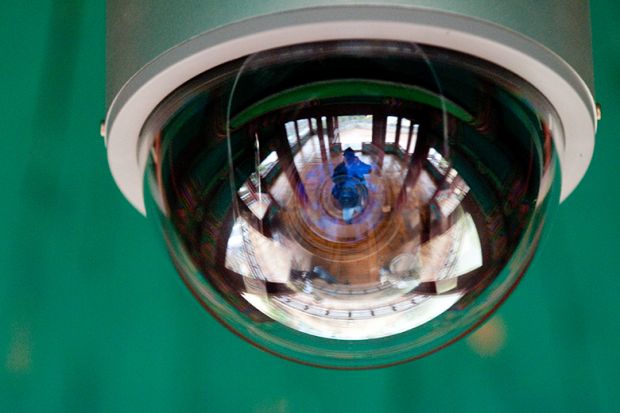Staff at Queen Mary University of London have warned that the installation of occupancy cameras in offices, laboratories and teaching spaces represents a “big step up” in surveillance on campus as they seek reassurances about how the data gathered will be used.
The university is spending more than £400,000 to roll out the technology across six of its buildings as part of efforts to assess the needs of its staff and estate post-pandemic.
It says this is the sole purpose of using the technology and it is not capable of identifying individuals and does not process personal data. The devices work by taking constant pictures, but these are deleted after being fed into an algorithm that plots usage patterns over time.
But staff say the positioning of the cameras – in some cases in offices used by only one or two people – would allow data to be gathered that could give a sense of someone’s movements, with many potential repercussions.
“This is a big step up in the level of surveillance of staff presence on campus in a context in which people really do not trust the senior management,” said James Eastwood, co-chair of the University and College Union (UCU) branch at Queen Mary.
“If you have got a camera in my office and you know it is my office, the occupancy data will tell you quite a lot about where I am at a given time.
“We’ve just been through a year in which the university has been encouraging students to report whether classes took place during strike action. I can easily see a situation where they use this technology for a similar purpose, if they wanted to.”
Dr Eastwood said there were further concerns that data gathered would have to be released – if requested – to third parties, such as the UK Border Agency, which handles visa applications that often have conditions of attendance attached.
Stuart Grieve, senior lecturer in physical geography at Queen Mary, said the need to assess occupancy levels was not disputed, but this had previously been done through surveys.
“We’ve gone from a piecemeal approach that was human-centred and had a lot of room for nuance to something that is totally in another direction,” Dr Grieve said. “If you want to understand occupancy levels and the way things are being used, then speaking to people in those departments is probably the best way to go about it.”
Similar tracking software is used at some other universities, including by UCL in its laboratories – and other companies use it in open-plan offices to assess hybrid working needs – but little is known about how it will work in a university-wide setting or how it overcomes any potential biases in the system.
Dr Grieve said this opened up the possibility that “flawed data” would play a big role in deciding which departments might need restructuring and where office and teaching space was expanded or contracted.
“We have a wide range of concerns, some of which come from the fundamentals of the technology – I don’t believe it is right to surveil employees – and some of which come from the opaqueness of the procurement process and how it will be used, which may well be resolvable by a more open, transparent way of managing this process,” he said.
A spokesman said Queen Mary was “committed to providing the best facilities for our students and staff, and to ensuring that we continue to work towards our sustainability goals”.
This required “ensuring our facilities are used in the most efficient and effective ways” and “therefore, we are following standard practice in installing space-utilisation monitoring to help us improve how our buildings are used”.
Register to continue
Why register?
- Registration is free and only takes a moment
- Once registered, you can read 3 articles a month
- Sign up for our newsletter
Subscribe
Or subscribe for unlimited access to:
- Unlimited access to news, views, insights & reviews
- Digital editions
- Digital access to THE’s university and college rankings analysis
Already registered or a current subscriber? Login








